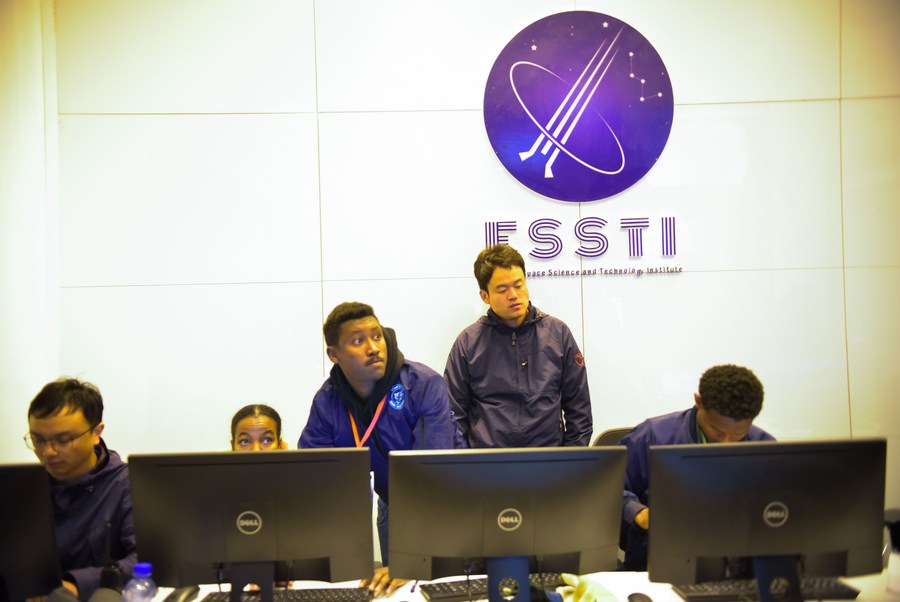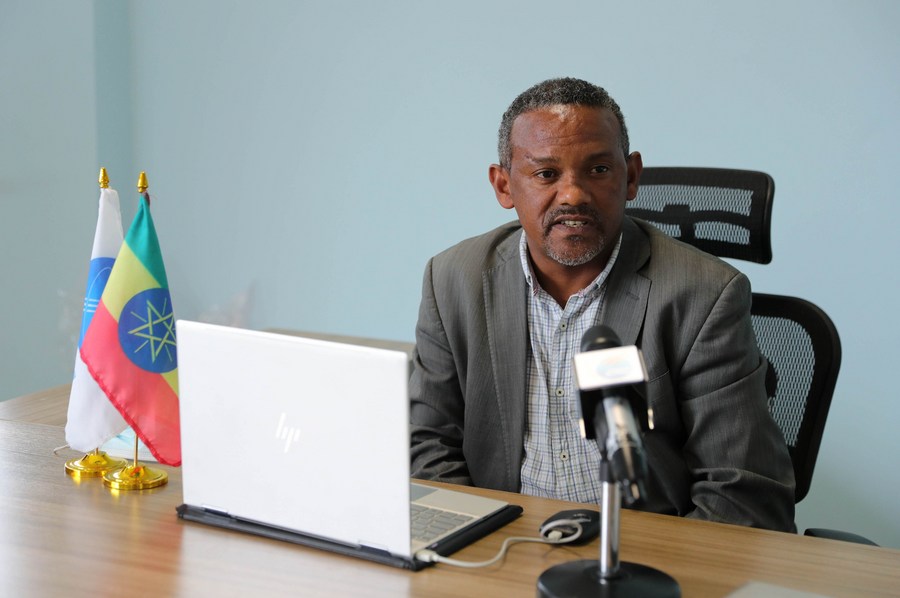China's engagement fuels Ethiopia's advancements in exploring space science

Chinese and Ethiopian engineers go about their work during a satellite launch at Entoto Observatory Center in Addis Ababa, capital of Ethiopia, Dec. 20, 2019. (Xinhua/Michael Tewelde)
"The satellite project in Ethiopia was not something that we expected to be successful in our generation, and I am very proud and impressed to be a part of this project," Kassaw told Xinhua in a recent interview. In December 2019, the East African country launched its first-ever satellite, abbreviated as ETRSS-1, into space from China.
ADDIS ABABA, Sept. 23 (Xinhua) -- On a typical rainy morning at the mountainous Entoto ground receiving station on the outskirts of Addis Ababa, the Ethiopian capital, Dawit Kassaw is busy monitoring the status of servers while identifying daily missions regarding satellite operations.
Kassaw, a unit leader for the ground application satellite system at the Ethiopian Space Science and Geospatial Institute, is one of the young Ethiopian space science enthusiasts who are shouldering the mammoth responsibility of solidifying Ethiopia's recent gains in its pursuit of advancements in space science, thanks to successful cooperation with China.
As one of the Ethiopian pioneers in this field, Kassaw expressed his pride and amazement at the success of the satellite project in Ethiopia in such a short span of time.
"The satellite project in Ethiopia was not something that we expected to be successful in our generation, and I am very proud and impressed to be a part of this project," Kassaw told Xinhua in a recent interview.
In December 2019, the East African country launched its first-ever satellite, abbreviated as ETRSS-1, into space from China. The command and control center is located on the 3,200-meter-high hill of Entoto on the outskirts of Addis Ababa.
With a passion for space science and satellite operations, Kassaw, who is at the forefront of Ethiopia's journey toward self-sufficiency in this cutting-edge field, embodies the positive impact of China's extensive support and capacity-building efforts.
Kassaw's daily activities at the Entoto Ground Receiving Station revolve around monitoring server status, identifying daily missions, and analyzing the data and imagery received from satellites.
"We have been to China twice for training purposes. In addition, we have also received on-site training by Chinese experts here. These training contents were new to us, in particular, and to our country in general, and have helped us a lot in our professional development," Kassaw said.
"The capacity development and knowledge transfer initiatives, particularly in remote sensing applications and satellite in-orbit operations, have equipped us with the necessary skills to confidently carry out satellite operations," Kassaw added. "The training and skills transfer efforts have provided us with the foundational knowledge and skills."
Thanks to the successful capacity building and knowledge transfer initiatives, Kassaw said Ethiopian professionals are now able to independently manage the entire satellite operations process and provide valuable insights for end-users.
Looking to the future, Kassaw expressed his aspirations to deepen his engagement and knowledge of satellite technology, particularly in the design phase of Ethiopia's future satellite projects.
"The contribution and support of the Chinese team in this project have been key factors that have helped us reach where we are now. We would like to thank our Chinese colleagues for their dedication and support," Kassaw said.
Just like Kassaw, fellow Ethiopian space science enthusiasts argue that the successful transfer of advanced technologies has empowered Ethiopian professionals to excel in the field, fostering innovation and driving the nation's progress in the space sector.
One of them is Melaku Muka, director of satellite operations at the Space Science and Geospatial Institute. Muka said the collaboration between China and Ethiopia in the space science and satellite operations sector has opened up new horizons for Ethiopia's development.
"Throughout the development, launch, and in-orbit operation of the satellite, the Ethiopian team has worked alongside Chinese partners, and we have received extensive training in different phases of satellite development and in-orbit operation. All this training has helped us gain technology transfer in the industry," Muka said.
"I can say that we will strive to build world-class infrastructure for satellite ground operations and provide reliable data for every sector of the country," he added.
Abdissa Yilma, director of the Space Science and Geospatial Institute, also shed light on the instrumental role played by China in realizing Ethiopia's space sector aspirations.

Abdissa Yilma, director general of the Ethiopian Space Science and Technology Institute, speaks during an interview with Xinhua in Addis Ababa, Ethiopia, April 29, 2021.(Xinhua/Wang Ping)
Yilma recounted the inception of the satellite project in Ethiopia, which began with collaborative efforts involving the Chinese government. This collaboration culminated in the signing of an agreement in April 2016 and led to the launch of Ethiopia's first-ever satellite from China in December 2019.
According to Yilma, the Chinese-backed satellite project in Ethiopia has proved crucial for various purposes over the past three years of operation, including providing valuable imagery for the East African country's agriculture and tourism sectors, among others.
Yilma emphasized how the satellite project has attracted widespread attention, motivating the entire population and instilling a sense of pride and enthusiasm, particularly among the younger generation.
ETRSS-1 is the result of support from the Chinese government, Yilma said, adding that without the initiation of this project, the country might have delayed its satellite programs. "That is truly a significant contribution from China because the project was financed by the Chinese government."
Recalling the challenging times brought about by the COVID-19 pandemic and its impact on the progress of Ethiopia's space science operations, Yilma underscored that the cooperation between Ethiopian and Chinese teams ensured the smooth operation of the satellite and the efficient reception of satellite imagery.
Yilma said as the partnership continues to strengthen, Ethiopia looks forward to undertaking more ambitious projects with China, leveraging its expertise and support to achieve more achievements in space science and satellite operations.
- Chinese, Ethiopian institutions strengthen collaboration on leadership development
- Feature: Chinese electric buses introduced to Ethiopia to advance green transport agenda
- Interview: BRI cooperation with China transforms Ethiopian lives for better
- Ethiopian official urges stronger cooperation with China
- Officials, scholars hail BRI's role in promoting development in Ethiopia

